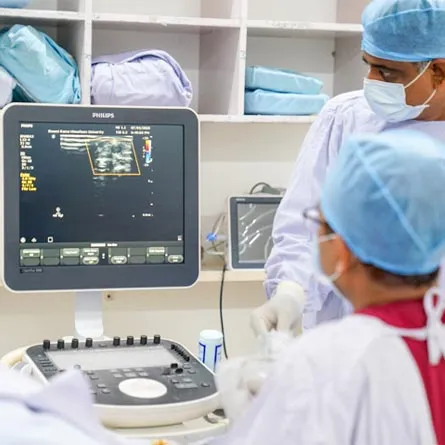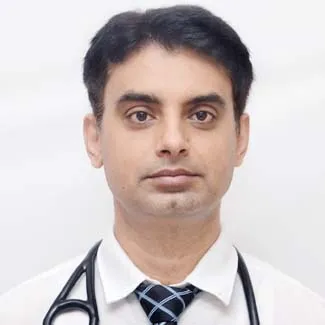
Kidney Care (Nephrology)
Nephrology relates to study of kidneys, kidney disease, preservation of kidney health, and treatment of kidney disease, from diet, medication to renal replacement therapy. Nephrologists specifically treat diseases that affect the kidneys and their ability to function, such as diabetes or kidney failure.
Some of the most Common Kidney Ailments include : Chronic Kidney Disease, Acute Kidney Injury, Stones, Infections, Cysts and Cancer.
Our Team
Chronic Kidney Disease is the most common ailment to strike kidneys. It is a long-term condition caused by high blood pressure and is difficult to cure. High blood pressure can exert pressure on the glomeruli, which are tiny blood vessels in the kidneys where blood is cleaned. Pressure can damage these vessels and the patient may require regular dialysis. Dialysis filters extra fluid and waste out of the blood. Dialysis can help temporarily but cannot cure completely. A Kidney transplant may be the next option resorted to. Diabetes too can cause chronic kidney disease. It results in increased level of sugar in the blood vessels, which hampers proper functioning of the kidneys by overloading with toxins.
Kidney stones
Kidney stones are a common kidney problem. These occur when minerals and other substances in the blood crystallize in the kidneys, forming solid masses (stones). Kidney stones usually come out of the body during urination. Passing kidney stones can be extremely painful, but they rarely cause significant problems.
Glomerulonephritis
This condition refers to the damage to the tiny filters inside the kidneys. It is usually caused by the immune system attacking the healthy body tissues.Glomeruli are tiny structures inside the kidneys that filter the blood. Infections, drugs, or congenital abnormalities can cause Glomerulonephritis. It often gets better on its own.

Polycystic kidney disease
This is a genetic disorder in which numerous cysts or sacs of fluidgrow in the kidneys. These can interfere with kidney function and cause kidney failure. Individual kidney cysts are common and normally harmless. Polycystic kidney disease is a separate, more serious condition.
Urinary tract infections
UTIs are bacterial infections of any part of the urinary system. Infections in the bladder and urethra are the most common. They are easily treatable and rarely lead to serious health problems. However, if left untreated, these infections can spread to the kidneys and cause kidney failure.
-
Chronic Kidney Disease
There is no cure for chronic kidney disease but timely treatment can help relieve the symptoms and prevent it from worsening. Treatment depends on stage and intensity. Lifestyle changescan help the sufferer stay healthy. Medicine is used to treat associated problems such as high blood pressure and high cholesterol.Dialysis, a treatment that replicates some of the kidney functions may be necessitated in advanced stages of CKD. Kidney Transplant may be resorted to in stage 5 CKD.
-
Lifestyle changes recommended
Stop Smoking, eat healthy, control salt intake, exercise regularly, restrict alcohol intake, lose weight, avoid over-the-counter drugs except when advised by a medical professional.
-
Medicine
Medicine can help treat various problems caused by CKD.
-
High Blood Pressure
Blood pressure is critical for the protection of kidneys. People with kidney disease must get their BP to below 140/90mmHg and those with diabetes must get it down to 130/80mmHg.
-
Diabetes or High ACR
Those afflicted with type 2 diabetes or high albumin to creatinine ratio (ACR) are administered dapagliflozin along with medicines for high blood pressure. Dapagliflozin lowers blood sugar and thereby shields the kidneys from damage.
-
High Cholesterol
Patients with CKD have high risk of cardiovascular disease, such as heart attack and stroke. This is because some of the causes of kidney disease are similar to those for cardiovascular disease including high BP and high cholesterol.
-
High Potassium Levels
Those suffering from CKD are at risk of developing high potassium levels in their blood. This is a life-threatening condition that requires immediate medical attention. Continual treatment and monitoring by a physician can correct the cause. Emergency treatment may include – Calcium given to veins or glucose and insulin given to veins to lower potassium levels.
-
Diagnosis
- Blood Tests – These are conducted to ascertain level of waste products such as creatinine and urea in the blood.
- Urine Tests – These analyze a sample of the urine to detect abnormalities that point out chronic disease.
- Imaging Tests – Ultrasound is used to assess kidney size and structure.
- Removing sample of kidney tissue for testing – Kidney biopsy might be required using local anesthesia and thin needle inserted into kidney. The biopsy sample is then sent to the lab for testing.
-
Hemodialysis
This treatment removes wastes and extra fluids from the blood. In this blood is pumped through soft tubes to a dialysis machine fitted with a special filter called dialyzer or artificial kidney. Here blood is filtered and thereafter returned to the bloodstream.
-
Peritoneal Dialysis
In PD, the patients blood is cleaned inside the body, not outside the body. The lining of the abdomen works as a natural filter. A cleansing solution flows into the abdomen through a soft tube called a PD.
-
Kidney Transplant
Kidney Transplant involves a surgery to transplant a healthy kidney from a living or deceased donor into a patient with end-stage kidney disease.
The Department of Nephrology at Himalayan Hospital is well known for its kidney transplant expertise. It is amongst the leaders in achieving transplant outcomes in northern India. A highly dedicated team of nephrologists here is at the forefront of care in the field of kidney care. Internationally recognized experts use validated innovations to successfully treat patients with kidney failures and complexities of diabetes and other ailments. They use specialized treatments, combining minimally invasive surgery with new machines. The department performs a large number of kidney transplants at any given time.
Contact us with queries
Transplant experts at Himalayan Hospital are available to answers your queries about the transplant process and post-transplant life.



